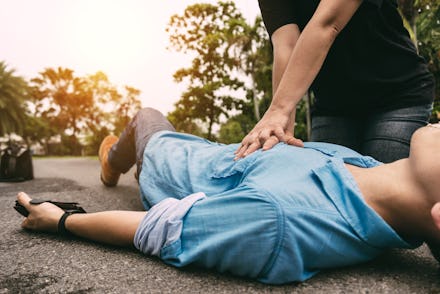About 1 in 5 people will witness someone collapse from cardiac arrest. But few will be able to help.

About one in five British adults will come across a collapsed person experiencing cardiac arrest, but the majority of them won’t help perform CPR, according to a recent study.
Researchers at the University of Warwick conducted an online survey of 2,084 adults in the United Kingdom and found that about 19% of their sample had already witnessed a person experiencing cardiac arrest outside of a hospital. And though about 93% of the survey participants said that they would at least call their local equivalent of 911 if they came across this situation, many of them said they’d be hesitant to perform CPR.
However, those results largely depended on the amount of training a person received. For those who learned CPR, 76% said they would try it on someone in dire need of help, while only 28% of the people who did not learn it said the same, the survey found. Considering that about 63% of participants didn’t have CPR training in the last five years, most people probably feel unprepared to act.
It’s worrisome, but it at least brings us to a logical solution: Make sure as many people as possible feel comfortable performing CPR.
“Our research shows just how important it is for everyone to learn CPR,” Gavin Perkins, a professor of critical care medicine at the University of Warwick, said in a release. “It is staggering to think that one in five of us will at some point have the opportunity to save a life by giving CPR.”
As many as 70% of Americans “feel helpless” in the face of cardiac arrest because they’re unsure of their ability to perform CPR, according to the American Heart Association. That, in combination with a number of other factors, amounts to a grim reality: Less than 8% of people in the U.S. who experience cardiac arrest outside a hospital survive.
Aside from a lack of knowledge, another issue at hand could be the “bystander effect,” a social psychological phenomenon that basically describes when people do not give help when it’s needed because they defer to other people who are also witnessing the situation. In the case of cardiac arrest, waiting even a few minutes to perform CPR could be the difference between life and death.
“The chance of surviving is almost zero if people collapse and receive no bystander CPR until the emergency services arrive,” Perkins said. “Thousands of deaths could be prevented if more people learn CPR.”
For those who are willing to learn, there are plenty of resources: The American Red Cross offers CPR courses online and in hundreds of classrooms. The American Heart Association also has an online search tool that allows users to find training centers based on their city or zip code.